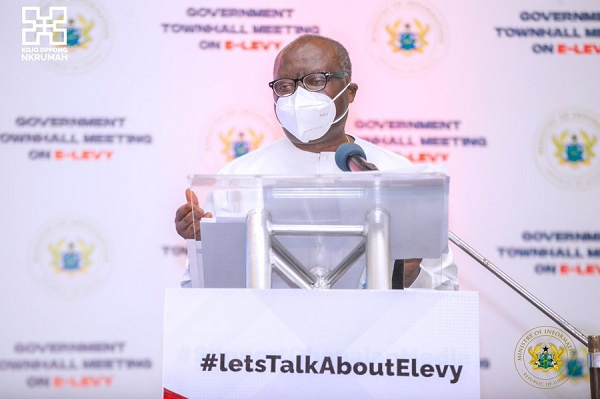E-Levy to impose 1.75% charge on all electronic transactions
E-Levy to generate GH¢6.9 billion in revenue this year
Support us to approve E-Levy – Government to citizens
Minister of Finance, Ken Ofori-Atta, has cautioned of dire economic consequences if the proposed Electronic Transaction Levy Bill is not be approved.
According to him, Ghana’s economy could potentially end up in disaster if lawmakers and citizens fail to support the tax measure.
Addressing participants at a Town Hall meeting on Thursday, January 28, Ken Ofori-Atta underscored the importance of the bill being approved in order not to erode the economic gains made by government.
“If we don’t do this E-levy, we are just pushing ourselves in a way that would potentially end up in such a disaster. There was a warning of that because last week was a very difficult week for the country.”
He cited that the recent down downgrade of Ghana economy by rating agency Fitch is a precursor of what may occur to the economy if the E-Levy Bill is not passed.
“Last week we got downgraded by Fitch because they do not believe we could raise the revenues that we had forecasted because we were fighting about E-levy…so we need to moderate that because the consequences are quick,” he said.
Ken Ofori-Atta contends that the revenue accrued from the E-Levy will generate some GH¢6.9 billion for the country this year.
Meanwhile, although a decision to approve the E-Levy is yet to materialize in Parliament, the Minority caucus has vowed to kick against approving the E-Levy citing it will place more hardship on the ordinary citizen.
Also, a cross-section of the public has bemoaned the introduction of the tax measure.
The E-levy is a new tax measure introduced by government in the 2022 Budget on basic transactions related to digital payments and electronic transactions aimed at widening the tax net and increasing revenue.
The measure, if approved, would place a charge of 1.75 percent on all electronic transactions that are more than GH¢100 daily (24 hours).
This will cover mobile money payments, ATM withdrawals, inward remittances among others.
